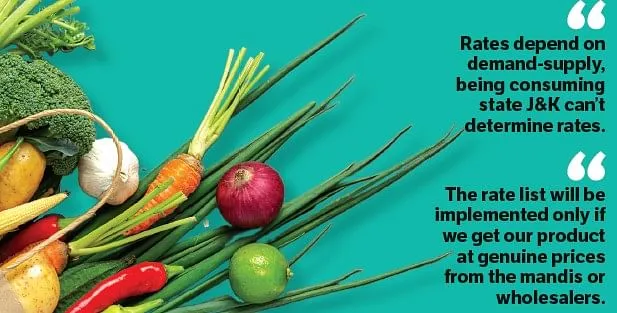Srinagar: The rate lists issued by the Food Civil Supplies and Consumer Affairs (FCS&CA) Department has seen poor implementation on the ground as prices of all eatables are at an all-time high.
The sluggishness on part of the competent authorities to regulate the rates of eatables and essentials is giving a tough time to the consumers.
The market prices of eatables have witnessed exorbitant hikes in absence of any enforcement by the FCS&CA in markets to regulate the rates of essential commodities.
The FCS&CA Department has received severe criticism from all walks of life over its failure to implement the rate lists of all eatables including fruits and vegetables which has given a free hand to the retailers to fix the prices as per their own will. The complaints of overpricing by the retailers are pouring in from all districts of Kashmir amid the failure of the authorities to issue a revised rate list of the eatables.
Amid the complaints, the retailers said that they receive the product (fruits and vegetables) from wholesalers, which are higher than the rates fixed by the department for the retailers.
“The rate list will be implemented only if we get our product at genuine prices from the mandis or wholesalers. Otherwise, the issue will remain persistent with no solution,” said Showkat Ahmad, a vegetable vendor in Baramulla.
As per the rate list issued by the Director of FCSCA Kashmir, the price of peas has been fixed at Rs 40 per kg but the retailers receive it at Rs 42 from the wholesalers.
“So, it is obvious that we can’t sell at Rs 40. This is the reason why the government rate list is not implemented on the ground,” the vendor said.
The rate of spinach and tomatoes has been fixed as Rs 25 each per kg but are being sold in the market at Rs 40 per kg.
Similarly, the rate of onions and beans has been fixed as Rs 30 per kg but are being sold at Rs 40 and Rs 50 per kg the in market.
The government has fixed the rate of cauliflower as Rs 35 per kg, which is sold at Rs 50 per kg in the market.
“We get 80 percent of the supply from outside Kahsmir and they send the vegetables as per their own rates due to which we are bound to follow the same price here,” another vegetable vendor said.
Besides vegetables, all varieties of fruits are being sold at exorbitant prices.
General Secretary of Fruit and Vegetable Association Shahid Chowdhary said they furnish the list of eatables to the FCS&CA Department on a daily basis after receiving the supply at the mandi.
“It is their job to implement the rates in the market. There is no fault from our side. The department should activate its checking squad to get the rate list implemented in the market,” Chowdhary said.
An official of the FCS&CA Department attributed the weak enforcement of rate lists in markets to various reasons saying that the rates fluctuate on a daily basis, which makes it difficult for the department to determine the rates of eatables and essentials.
“The basic reason for poor implementation of the rate list is that our state is dependent on outside produce, particularly during the winter. We are consumers and how can we determine the rates of the products which we receive from outside,” the official said.
He said that the rates were determined by market (mandi) on the basis of deamdn and supply of the product and the rates continue to fluctuate on a daily basis.
“So I think issuing a rate list in such a condition becomes a vague exercise,” the official said. “This is the reason that the rate lists have no impact on the ground.”
He said that two years back, the rate of meat was fixed as Rs 535 per kg but was being sold at Rs 600 in the market.
“This is because the rates outside J&K mandis are already higher than Rs 535 and the retailer is bound to sell it at a higher price,” the official said.
He said that the government fixed rates could be implemented only if J&K provides its own livestock.
“J&K is not a producing state as a result of which the rates never get regulated properly,” he said.
Director of FCS&CA Department Abdul Salam Mir said that the rate lists were based on rates determined at fruit and vegetable mandi in Srinagar.
“If there is a fluctuation in the rates of eatables and other essentials, the retailers can make a representation and we will revise the rates. We can also issue the rate lists on a weekly basis to regulate the market price,” he said.







